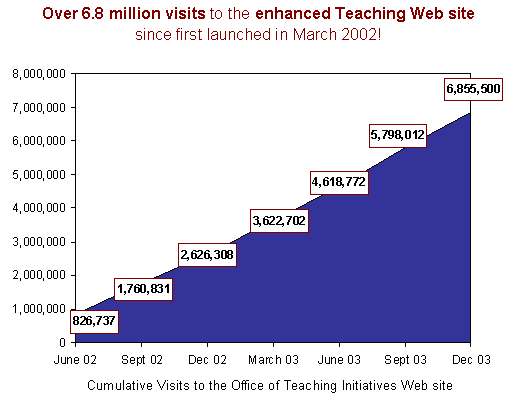|
THE
STATE EDUCATION DEPARTMENT /
THE UNIVERSITY OF THE STATE OF NEW YORK / ALBANY, NY
12234 |
|
TO: |
The Honorable the Members of the Board of Regents |
|
FROM: |
|
|
COMMITTEE: |
Full Board |
|
TITLE OF
ITEM: |
Update: Regents 1998 Teaching Policy |
|
DATE OF
SUBMISSION: |
February 3, 2004 |
|
PROPOSED
HANDLING: |
Discussion |
|
RATIONALE FOR
ITEM: |
Periodic update on implementation of Regents teaching policy and proposed next steps |
|
STRATEGIC
GOAL: |
Goals 1, 2, 3, and 4 |
|
AUTHORIZATION(S): |
|
SUMMARY:
As we begin the new year, it is appropriate to provide an update on the significant progress made to implement the Regents teaching policy, given its important role in helping all students achieve consistent with the State learning standards. We are pleased to provide this report to highlight successes, describe work that remains, and propose next steps to implement the teaching policies proposed by the Regents Task Force on Teaching and adopted by the Board of Regents in 1998.
The Task Force identified four critical gaps related to teaching in New York State:
· Gap 1: New York does not attract and keep enough of the best teachers where they are needed most;
· Gap 2: Not enough teachers leave college prepared to ensure that New York’s students reach higher standards;
· Gap 3: Not enough teachers maintain the knowledge and skills needed to teach to high standards throughout their careers; and
· Gap 4: Many school environments actively work against effective teaching and learning.
Members of the Task Force considered numerous proposals for closing the gaps and refined the proposals over many months of reflection and consultation. In July 1998, the Board of Regents unanimously approved the recommendations of the Task Force and have been continuously enacting a rigorous new teaching policy - “Teaching to Higher Standards: New York’s Commitment” since that time.
Significant progress has resulted from the Regents teaching policy, as evidenced by steady improvements in schools and teacher preparation programs across New York State. In so many cases, the State’s colleges and universities, schools, teachers, and students have exceeded the Task Force’s expectations. As we await the first class of prospective teachers prepared under the new Regents standards to graduate from teacher preparation programs in May 2004, we take this opportunity to reflect on our achievements and look forward to the future.
Many partners have worked tirelessly with the Regents and the Department toward achieving shared goals. Continued success depends on collaborative efforts to expand ongoing initiatives, create new alliances, and advance targeted strategies aligned with Regents policy.
This item briefly describes:
· the work of the Task Force;
· policies enacted by the Regents and work under way to carry out the recommendations of the Task Force;
· next steps toward implementing policies; and
· plans for evaluating the outcomes of the Regents policies.
Update: Regents 1998 Teaching Policy
The Task Force. In 1996, the Regents adopted 28 Learning Standards for elementary, middle, and secondary education students. The Board recognized the need to ensure a sufficient number of qualified staff to assist all students in achieving those Standards. A Task Force was appointed to examine the state of education in New York State and recommend steps to ensure that all students have qualified teachers.
The Task Force, co-chaired by Regents Diane O. McGivern and Robert M. Johnson, held 24 meetings with educators and other constituents over two years. The Task Force conferred extensively with hundreds of stakeholders and other interested parties, and held eight forums around the State for public comment. The Task Force also convened a panel of 26 college presidents to make recommendations for improving the quality of teacher preparation.
After considering data, scholarly studies, professional advice, and public comments, the Task Force identified four gaps between the condition of the State’s educational system and the goal of a system with qualified teachers for all students.
· Gap 1: New York does not attract and keep enough of the best teachers where they are needed most [Recruitment and retention];
· Gap 2: Not enough teachers leave college prepared to ensure that New York’s students reach higher standards [Higher education/pre-service];
· Gap 3: Not enough teachers maintain the knowledge and skills needed to teach to high standards throughout their careers [Professional development for existing classroom teachers]; and
· Gap 4: Many school environments actively work against effective teaching and learning [Environment].
The Task Force considered numerous proposals for closing the gaps, refined those proposals over many months of reflection and consultation with interested parties and made a series of recommendations to the Board of Regents.
Regents Teaching Policy: Progress and Accomplishments
In July 1998, the Board of Regents unanimously approved the recommendations of the Task Force. The Regents rigorous new teaching policy, known as “Teaching to Higher Standards: New York’s Commitment,” consisted of far-reaching reforms to ensure qualified teachers for all children. Over time, the Regents teaching policy has proven to be a strong, guiding framework for action. At the same time, the policy is flexible enough to remain practical in an ever-changing educational environment. Tremendous work continues to implement the Regents policy. Highlights of the successes and accomplishments to address the four gaps identified by the Task Force include:
I.
Recruitment and Retention: Attract
and Keep Enough of the Best Teachers Where They Are Needed
Most
Ensuring an adequate supply of qualified
teachers in New York State’s public schools was a top priority for the Task
Force. The Regents have furthered
this goal through a comprehensive action plan built on flexibility, efficiency,
and collaboration – all while maintaining high standards.
Assist School Districts with Teacher
Recruitment
The Board of Regents and the Department
have worked closely with local educators in the Big Five school districts to
convene five “Call to Teaching”
forums. The forums were
designed to communicate with educators about the need and initiatives necessary
to recruit, prepare, and retain qualified teachers for all schools. They also
provided an opportunity to talk directly with over 1,600 high school students
and students in teacher education programs about the teaching profession.
The forums resulted in strong linkages across
the K-12 and higher education communities and energized educators and
students. The Department targeted print, media, and
Internet resources to support recruitment and
employment of qualified teachers:
- Developed the New York © Teachers brochure and Pathways to Teaching in New York State: A Resource Guide for College and University Administrators to promote careers in teaching in New York State and inform prospective teachers and administrators of the pathways to certification.
- Expanded outreach to minority populations through events like the Forum on the Future of Hispanic Education, the Black and Puerto Rican Caucus, the Hispanic Heritage Month Celebration among others.
- Assisted the NYCDOE with recruitment activities in the U.S. and in other countries.
An enhanced
Office of Teaching Initiatives Web site provides important
information on teacher certification requirements, regulatory changes,
alternative preparation programs, programs like Troops to Teachers, Teacher
Opportunity Corps, etc. The Web
site includes information for paraprofessionals who want to become certified
teachers and provides links to the NYCDOE Web site and to TEACHNY.com, which
have job listings for New York City public schools.
Teachers recognized for their dedication to the profession and their skills in the classroom are the best voice for teaching as a profession. Through the Department’s New York State Teacher of the Year Program, we recognize and celebrate outstanding teachers across the State. Teacher of the Year finalists and winners participate in Call to Teaching Forums and are often asked to speak at conferences, write articles and serve on Boards, panels and other groups focused on teaching and learning. These distinguished educators are the best recruiters for the next generation of teachers and frequently serve as “ambassadors” for the profession.
Provide Prospective New York State Teachers
Diverse Pathways to Certification While Maintaining High
Standards
Alternative Preparation Programs
To encourage qualified
career changers and others to pursue careers in teaching, in 1999 and 2000, the Board of Regents
approved two models for alternative teacher preparation programs.
Twenty-nine campuses
statewide now have approved alternative
teacher preparation programs. Candidates teach with Transitional
Certificates and receive district mentoring and college supervision while
completing their studies.
As a result of the alternative
teacher preparation programs, the NYCDOE has placed nearly 6,000 newly certified teachers in the New York City
public schools - including SURR schools (September
2003).
Number
of Prospective Teachers Entering Alternative Teacher Preparation Programs
in New York City 2000-2003
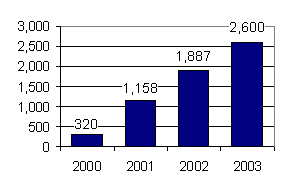
In December 2003, the Regents approved
regulatory changes to continue the individual
evaluation pathway to certification (also know as transcript
evaluation). Approximately 7,000 to 10,000
teachers are certified for the first time through this pathway
annually. College graduates certified via transcript evaluation
include individuals interested in second careers in teaching, part-time
students, certified teachers interested in second teaching certificates, and
individuals educated outside of the United States. More teachers are certified in hard-to-staff subject
areas (i.e., the sciences, second languages, mathematics, bilingual,
and ESOL) via transcript evaluation than any other pathway. This
regulation will sunset in 2007 for a childhood education certificate and in 2009
for all other certificates.
To help
teachers from other states become certified in New York State, the
Regents created the Conditional Provisional
Teaching Certificate.
The certificate provides teachers from other states two years to complete
the NYS Teacher Certification Examinations (NYSTCE). During the two-year period,
the teachers can work as certified teachers in New York (April 2001). Since 2000, 4,702 Conditional Provisional Certificates have been awarded
to qualified candidates. Plans are currently under way to extend this
pathway to permit out-of-state teachers to qualify for conditional Initial
Teaching Certificates after February 2004.
The Regents also agreed to accept National Board for Professional
Teaching Standards (NBPTS) certified teachers for equivalent certification in
New York State.
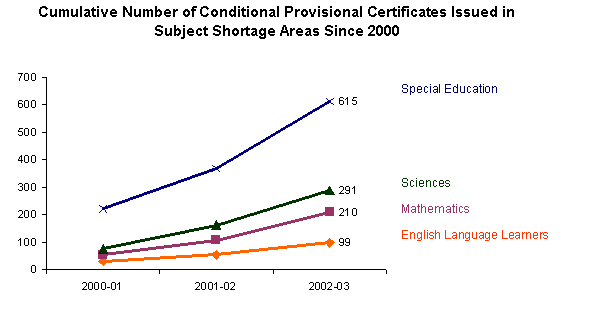
Help
All Qualified Individuals Meet Certification
Requirements
Representatives of the higher education
community and Department staff drafted guidelines for two-year/four-year education programs.
Seven community colleges and five senior colleges now offer more than 75 joint teacher education
programs.
By September 2003, Regents policy required
all teachers in New York to be certified to teach in the State’s public schools;
temporary licenses were discontinued. However, recognizing the State’s continuing critical teacher
shortage, particularly in shortage subject areas, in 2003, the
Regents approved modified temporary licenses
for the 2003-04 and 2004-05 school years for staff who were close to meeting the
teaching requirements. This includes people who taught with temporary
licenses in the 2002-03 school year, passed the Liberal Arts and Sciences Test
(LAST), but needed additional time to complete the balance of the education
requirements for Provisional or Initial certification. To date, 1,164 modified temporary licenses have been
issued – 819 in New York City and 345 in upstate New York. Another 550 applications for modified
temporary licenses are now pending and will be issued as soon as necessary
documentation is received.
Help Schools Recruit and Retain Teachers in Hard-to-Staff Subject Areas
New
York State continues to face a significant shortage of bilingual education, bilingual special
education, math, second languages and science teachers as well as teachers of
English to speakers of other languages (ESOL). The Regents and the
Department have undertaken a number of initiatives to help schools recruit and
retain qualified teachers in hard-to-staff subject
areas:
Programs and Pathways to Certification to
Recruit and Retain Teachers in Hard-to-Staff Subject Areas
To address the shortage of math teachers, the Department, the NYCDOE and four colleges in the NYC Metropolitan Area collaborated to pilot a Math Immersion Program within the NYC Teaching Fellows Program. Qualified college graduates with math-related experience are placed in math teaching assignments. During a summer introductory program, participants are provided intensive preparation in mathematics and pedagogy. All Teaching Fellows are required to pass the Math Content Specialty Test (CST) before entering the classroom. In the first year of the pilot, over 85 percent of 100 candidates passed the CST on the first try; this year over 96 percent of 350 candidates passed. The program is proving to be an effective pathway for preparing teachers in a critical shortage area.
A pathway was created to allow licensed speech language pathologists to qualify for Provisional Teaching Certificates as teachers of speech and hearing handicapped students, thereby increasing the pool of qualified candidates to serve as teachers in critical shortage areas (Fall 2000). We estimate that approximately 90 licensed speech language pathologists have already taken advantage of this opportunity. Plans are under way to extend this pathway to enable speech language pathologists to qualify for the new Initial Certificates after February 2004.
Participants in Intensive Teacher
Institute (ITI) programs formerly received temporary licenses; many went on to
teach in hard-to-staff subject areas. To
ensure that ITI program participants remained eligible for employment
when temporary licenses ended in September 2003, the Department worked with the NYCDOE and
colleges and universities to convert ITI
programs in bilingual education and bilingual special education to alternative
teacher preparation programs.
Individuals
in alternative teacher preparation programs can now receive Transitional B
certificates and teach bilingual or ESOL classes if they
pass the LAST exam and any appropriate content specialty test (July 2001). Through October 2003, 28 individuals
received Transitional B certificates to teach bilingual or ESOL classes.
To understand the opportunities and challenges associated with expanding
teacher certification programs in hard-to-staff subject areas, the
Department is surveying all colleges with
special education and bilingual special education programs. The survey will help to determine the number of students
enrolled in these programs and identify factors that hinder student enrollment
growth in shortage areas (e.g., lack of students, faculty and/or financial
resources). This information is
being shared with the colleges and the NYCDOE so appropriate strategies can be
developed to help reduce these impeding factors.
As part of its priority legislative program,
the Board of Regents is advancing a bill to remove the pension penalty to allow retired public
employees (including teachers) to enter or re-enter teaching in hard-to-staff
subject matter areas and schools.
Targeted
Resources
The Teachers of Tomorrow (TOT) grant program
was created in 2000 to recruit and retain
qualified teachers in hard-to-staff schools and subject areas; over
$95 million has been provided to
support teachers through 2004.
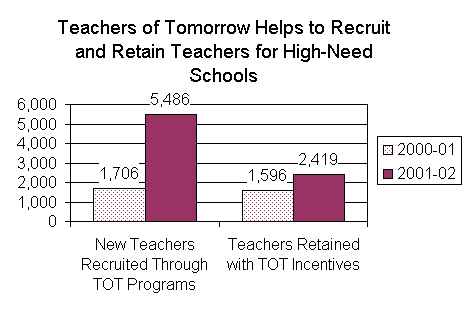
Approximately $2 million in IDEA funds for the 2002-03
and 2003-04 school years was provided to the NYCDOE by the Department to support
the preparation of special education and
bilingual special education teachers. These funds have been used to support a
cohort of 35 special education teacher candidates and a cohort of 35 speech
language pathologists. In addition,
these funds have been used for recruitment and outreach activities by the NYCDOE
for special education shortage areas.
The Department will continue to support these programs in 2005.
The Department was awarded two federal grants totaling $3.4 million to
support the graduate study of 800 new
Teaching Fellows at six independent colleges including Long Island
University-Brooklyn, Pace University, and St. John's University for the
Transition to Teaching Project and Fordham University, Pace University, and
Mercy College for the Teacher Recruitment Project. The funds are targeted at preparing Teaching Fellows in hard-to-staff subject
matter areas.
Intensive
Teacher Institute (ITI) funding will be redirected to support Transitional B
bilingual/ESOL certificate programs for bilingual or ESOL general education and
special education teachers who have passed the LAST and CST until
2005. The ITI will shift its focus to
undergraduate programs.
The Department has supported, with IDEA
funds, a multi-state teacher retention
study designed to test strategies to increase teacher retention in
our hard-to-staff areas. This program is being piloted in New York City, Buffalo, and other districts
across New York State.
Findings from the study are expected to be available beginning in June
2004.
Efficiencies
At the request of the NYCDOE, the Department arranged with the National Evaluation Systems (NES) to offer eight additional special administrations of the NYSTCE exams in New York City in 2003-2004. This was done to assist as many qualified applicants as possible meet the requirement and become certified. Dates were scheduled so Teaching Fellows could complete the exams required to enter alternative teacher certification programs. In 2004-2005, the Department and NES anticipate increasing the number of regular statewide administrations of the NYSTCE from five to seven.
Beginning in February 2004, NES anticipates making NYSTCE test results available
within five weeks. This will facilitate recruitment of newly certified
teachers through both the traditional and alternative teacher
preparation programs.
The Department is re-engineering the teacher certification process
to expedite the certification of
prospective teachers and provide important information to all
teachers seeking employment in NYS public schools. Through increased efficiency and
enhanced customer service, significant progress has been made toward improving
the process.
- We continue our work to streamline the process for reviewing college-recommended applications; turnaround time from what previously averaged three to four weeks to process has been reduced to an average of one week to 10 days under the new system.
- Staff continue work to reduce the processing time for transcript evaluation applications from 16 weeks to a goal of 10 weeks.
- Work is under way to reduce the processing time for BOCES-evaluated applications from an average of three to four weeks to two to three business days from receipt.
- Streamlined and improved applications for teacher certification are now available.
- Confirmation letters, acknowledging receipt of application materials, are now automatically generated and sent to applicants for teacher certification.
II.
Higher
Education/Pre-service:
Ensure Teachers are Prepared to Help New York’s Students Reach High
Standards
In 1999, the Regents and the Department
identified the knowledge and skills necessary
for teachers to meet the learning needs of students with diverse backgrounds and
characteristics. Academic preparation now requires education in a
general liberal arts and sciences core, a content core, a general pedagogical
core, and additional knowledge and skills required for specific
certificates. Since that time, the Regents and Department have been working closely
with colleges and universities with teacher preparation programs to help ensure
all programs meet Regents standards.
The
Department reviewed over 3,500 modified teacher preparation programs at 110
campuses in 2000 and 2001 and re-registered those that met program
standards and prepared candidates to teach all students to State Learning
Standards.
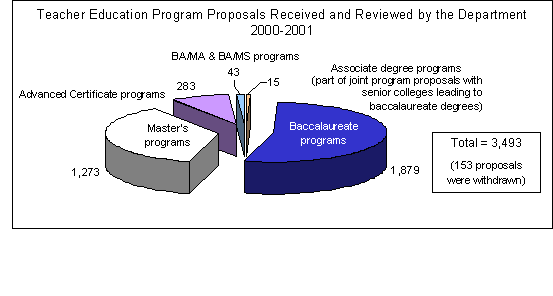
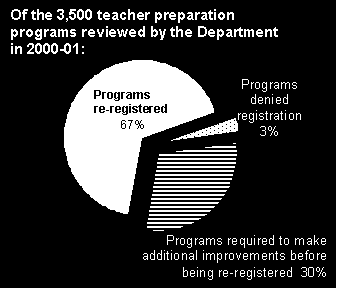
Of the 3,500 teacher preparation programs
reviewed in 2000-01, two-thirds met program
standards by preparing candidates to teach all students to State Learning
Standards and were re-registered; 30 percent were required to make
additional improvements before being re-registered; three percent were denied
re-registration [four institutions discontinued their education
programs].
-
The Department provided mini-grants (up to $7,000) to 55 colleges
to help them redesign their special education
certification programs.
The grants helped to ensure that general pedagogy and special education
pedagogy were effectively blended within coursework, thereby addressing Regents
standards for special education in the new programs.
-
The Department also financially supports
two Higher Education Support Centers in New
York State. The Higher
Education Support Center at Syracuse University is a consortium of 67 colleges
preparing teachers for our State. The Center works with member colleges and
participating districts to strengthen special education programs in our K-12
schools. The other center is the Bilingual Special Education Higher Education
Support Center located at Buffalo State College. This
Center is designed to develop additional statewide capacity for preparing
bilingual special education teachers.
The first cohort of teachers prepared through improved programs will graduate in May 2004 and thereafter will qualify for new Initial and Professional Certificates that reflect improved preparation, with greater focus on student developmental levels (early childhood, childhood, middle childhood, and adolescence). This cohort of new teachers will begin teaching this Fall.
The Department regularly works with institutions to ensure teacher preparation programs adhere to the new Regents program standards.
-
The Department’s Teacher Education Team
makes frequent visits to the Alternative
Teacher Preparation Programs at 29 institutions that prepare career
changers. In addition to
monitoring the programs, staff provide
important program information and technical assistance.
-
The Regents and
the Department established an 80 percent pass
rate on teacher certification examinations for each college’s
graduates. Ninety-five percent of institutions have met the
requirement. An
additional six colleges are progressing with corrective action plans and
Department monitoring. Through
campus visits and regular telephone and e-mail communications, the Department’s Teacher Education Team is working
closely with these institutions to provide significant support and recommend
opportunities for program improvements. Despite corrective action plans and Department
assistance, however, three of the six colleges face possible program closure in
2004-2005.
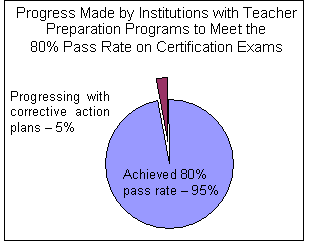
To provide for greater accountability,
all 3,500 teacher preparation programs
registered by September 1, 2001, must be accredited by December 31, 2006
to ensure they meet Regents standards and prepare effective teachers
to help all students meet State Learning Standards; programs registered after
9/1/01 have seven years to achieve accreditation.
-
To date, 15 of the
110 campuses have already achieved professional education accreditation. All
institutions attempting accreditation of their registered programs, which were
modified in 2000-01 to meet the Regents new teacher education standards, have
achieved accreditation.
-
95 campuses are now seeking accreditation
by NCATE, TEAC, or the Regents (RATE). 70 colleges are scheduled for
accreditation visits by Fall 2004; all visits have been
scheduled between Fall 2002 and Fall 2006.
All institutions
will
have completed their self-studies by July 1, 2004.
In addition to making accreditation
visits, in Spring 2004, the Teacher Education
Team will review 150 proposals to re-register programs preparing school building
leaders, school district leaders, and school district business leaders, based on
the new standards for preparing education leaders. Approved programs may begin admitting
students in Fall 2004.
Several
institutions provided positive feedback on the effects of the new teacher education standards and
accreditation requirements on program quality. For example, while preparing for
the Regents accreditation review (RATE), Skidmore College in Saratoga Springs, New
York recognized the need to improve the preparation of elementary teachers to
teach mathematics and made appropriate
adjustments in curriculum and staffing even before the accreditation
site visit began.
III.
Professional
Development: Help Teachers Maintain the Knowledge and Skills
They Need to Teach to High Standards Throughout Their
Careers
The Regents approach to helping all children in New York State achieve high learning standards is two-pronged. First, it is essential that all new teachers enter the classroom with a demonstrated record of academic preparation and a commitment to lifelong learning. At the same time, it is equally imperative that the 220,000+ teachers already in the classroom remain highly qualified throughout their careers. The Regents continue to work with teachers and school districts to encourage a commitment to lifelong learning.
The
Regents now require all school districts and BOCES to have plans for providing
staff with substantial professional development related to student
learning needs and State initiatives, standards, and assessments. Additionally, districts and BOCES must
establish annual or multi-year plans for annual professional performance reviews of
teachers and other staff (effective 2000).
Effective in 2004, teachers with Professional Certificates are required to complete 175 hours of professional development related to student learning needs and State initiatives, standards, and assessments every five years.
Beginning in September 2004, all first-year teachers with Initial
Certificates must participate in a prescribed mentoring relationship with an experienced
colleague in their first year of teaching to qualify for the Professional
Certificate.
The State Professional Standards and Practices Board on Teaching developed a Code of Ethics for Teachers in 2003 to guide professional expectations; the Code of Ethics is available on the Department’s Web site at www.highered.nysed.gov/tcert.
An online reading academy is changing the provision of professional development statewide; such courses change classroom practices so that teachers spend increased amounts of time providing quality reading instruction and using assessments effectively to modify instruction.
IV.
Environment:
Improve the School Environment
Effective teaching and learning can only
occur when our State’s schools are safe, clean, and equipped with necessary
resources and tools. We must work
together with school and community leaders to continuously improve the school
environment.
Improve the Preparation and Practice of
School Leaders
In 1998, Commissioner Mills established the
Blue Ribbon Panel on School
Leadership. The Task
Force strongly believed that effective school leadership was a necessary
condition for improved student learning.
As a result of their important work, in 2003, the Regents adopted regulations to improve
the preparation and practice of school leaders. The initiative was developed with
input from the field, including college
presidents, deans of education, and school leaders. Forty-nine institutions are
now modifying their leadership programs to meet the new standards in September
2004.
Ensure the Safety and Well-being of Our
Students
To help ensure the safety of our children in school, the Safe Schools Against Violence in Education (SAVE) legislation (2001) requires that all new applicants for teaching certificates and prospective school employees undergo fingerprint supported criminal history background checks to become eligible for certification and/or "cleared for employment."
The
Regents adopted extensive new regulations that have strengthened standards for
student attendance and, with the SAVE legislation, more effective strategies
have been put in place for disruptive
students to be removed from the
classroom.
In 2001 and 2002, an advisory group explored and reported on suggested improvements in the preparation of staff providing services for pupils (e.g., school counselors, school social workers, and school psychologists).
Seek Increased Aid to Improve School Buildings
The Department has proposed improvements in the State Aid
Formula that would increase
flexibility for directing resources to areas of need, and seek
increased aid for schools. The New York State
Legislature has enacted many of the Regents proposals including the school facilities bond act and funding
construction projects at the schools most in
need.
Regents Teaching Policy: Work Under
Way
While significant progress has been made to implement the Regents rigorous teaching policy, work continues to ensure qualified teachers for all children. Some examples of work under way to continue to carry out the recommendations of the Regents Task Force on Teaching include:
The Department is working with partners to
develop targeted recruitment
initiatives designed to attract
qualified candidates who will seek certification in subjects with teacher
shortages, and who will accept employment and remain in geographical shortage
areas. Examples of
programs include Today's
students, Tomorrow's teachers, Troops to
Teachers, and the New York City Teaching Fellows as well as similar Transitional
B and Transitional C programs.
In line with the Regents teaching policy, the Department is now preparing to conduct both a formative and summative evaluation of the major components of the Regents teaching policy. The first cohort of graduates of the now 3,830 modified teacher education programs will begin teaching in September 2004. While we await the results of the comprehensive evaluation under way to assess the effectiveness of teachers prepared under the new policy, we will be monitoring other indicators of success:
- To ensure that teacher education programs are preparing candidates with necessary knowledge and skills, the Department closely monitors the scores of teacher education graduates on the New York State Teacher Certification Examinations (NYSTCE). Institutions where less than 80 percent of their graduates have passed these examinations must prepare corrective action plans designed to achieve the 80 percent standard. The Department monitors progress made to improve the pass rates and prevent de-registration of the programs.
- All teacher education programs must be accredited by 2006. Through accreditation, institutions document that they have successfully prepared qualified teacher candidates who can teach all students to achieve the Regents Learning Standards. During accreditation site visits, the Department looks for evidence that the programs have been successful in achieving this goal. Staff interview teacher education candidates; look at their work; and interview faculty in both the education and liberal arts and sciences programs. In addition, Department staff visit schools where newly prepared teachers are employed, observe classroom instruction, and interview teachers and administrators. These accreditation visits provide a rich body of information on the effectiveness of the programs and the newly prepared teachers.
- The Department supports and cooperates with institutions and consortia that are evaluating teacher education in New York State. A major study is being conducted in collaboration with CUNY and a significant number of independent colleges in the New York City metropolitan area. That study is examining the different pathways toward teacher certification and will follow the newly prepared teacher candidates over the next few years to determine their impact on student outcomes. Other studies by individual colleges are also under way and will help to inform Regents assessment of the effectiveness of the 1998 teaching policy.
Work is under way to develop new standards for the preparation of pupil service providers. In 2001 and 2002, advisory groups recommended improvements for the preparation of staff providing services for pupils (e.g., school counselors, social workers, and psychologists). The Department is now developing standards that build on the recommendations of the advisory groups.
In 1998, members of the Regents Task Force on Teaching recognized a gap between the teacher certification structure and the K-6 tenure area established in Education Law. The Department is now preparing to engage all relevant stakeholders to determine how the tenure areas and the certification system can be aligned to ensure that teachers are properly tenured in the areas of their certification.
A number of activities are under way to provide teachers in the classroom with quality professional development opportunities:
- Teachers will have access to the State learning standards and best curriculum and instructional practices through the State Education Department’s Virtual Learning Space.
-
The New York State Reading Resource Center will serve as a
centralized resource for research
information and, through expansion of the Virtual Learning Space,
teachers will have access to
scientifically-based reading research and best practices.
-
The Statewide Math Resource Center will conduct
research, identify core math knowledge that teachers need and create the curriculum for training math
teachers statewide.
-
Professional development for teachers will
be increased through regional and
school-based training coordinated by the Regional and New York City School
Support Centers using the New York State Education Department Virtual
Learning Space targeted toward improving math
and early grade reading student achievement.
The Office of Higher Education continues to support the Office of Elementary, Middle, Secondary and Continuing Education (EMSC) in efforts to improve school environments and working conditions.
Regents Teaching Policy: Next Steps
There has been significant progress made on the implementation of the policies created by the Regents Task Force on Teaching. In many cases, colleges and universities, schools, teachers, and students across New York State have exceeded the Task Force’s highest expectations. The Regents and the Department continue close collaboration with many partners to carry out the Regents policy. Future challenges predicted to impact teacher supply and demand include New York’s economic condition; available resources; aging workforce; and Federal requirements that impact schools, teachers, and teacher education programs. The Regents and the Department continue to consider shortage area concerns as well as supply and demand data as we implement the recommendations of the Regents Task Force on Teaching.
Since the Regents policy was
enacted in 1998, strategies to implement the policy are continuously evaluated
as the educational environment changes and evolves. The State Professional
Standards and Practices Board on Teaching works with the Department to ensure
that implementation of the policy continues to carry out the Regents goals. In the coming months, based on feedback
from the field and outcomes achieved, the Regents and the Department will
re-evaluate the continuing applicability of some of the strategies in place to
implement Regents policy. Potential
areas of consideration may include the full-time faculty requirement and
teaching load requirements.
The Regents and the Department will continue collaborative efforts to expand initiatives, create new alliances, and advance targeted solutions to ensure qualified teachers for all children in public schools in New York State.
Attachment A: New York State Pathways to Teacher Certification
Attachment B: Comparison of Requirements in Former and 2004 NYS Certification Models
Attachment C: Institutions in New York State that Prepare Teachers (noting Alternative Preparation Programs)
Attachment
A
Attachment A: New York State Pathways to Teacher
Certification is a brochure that is not easily converted to this
format. Copies will be provided to the Board of Regents at the time of the
February meeting.
Attachment B
COMPARISON
OF REQUIREMENTS IN FORMER AND 2004 NYS CERTIFICATION
MODELS
|
NYS Requirement |
Former Model
(prior to 2/2/04) |
February 2004 Model
(after 2/1/04) |
|
First-Level
Authorization To
Teach |
Temporary
License: ·
bachelor’s
degree; ·
no
tests; ·
annual renewal
permitted for teacher
shortage areas
Provisional
Certificate: ·
bachelor’s degree;*
·
6 credits in each:
English, math,
science, social studies; ·
36 credits in
subject; ·
30 credits in
education; ·
student
teaching; ·
2 tests (LAST and
ATS-W); ·
valid 5
years |
Transitional
Certificate: ·
bachelor’s
degree; ·
30 credits in subject,
or ·
18 credits in subject
and 12 in related
field; ·
200 hours of pedagogy;
·
2 tests (LAST and
CST); ·
mentored
teaching;
·
valid 3 years
Initial
Certificate:** ·
bachelor’s
degree;*** ·
broad core in liberal
arts & sciences; ·
major or equivalent in
subject; ·
specified pedagogical
core; ·
100 hours diverse
field experiences; ·
student teaching or
internship; ·
3 tests (LAST, ATS-W,
CST); ·
fingerprint
clearance ·
valid up to 4
years |
|
Second-Level
Authorization |
Permanent
Certificate:
·
master’s degree in
related field
(broadly defined); ·
2 years satisfactory
teaching; ·
test (CST and
ATS-W) |
Professional
Certificate: ·
master’s degree with
12 graduate
credits in subject taught or
related subject, or master’s in a new
classroom teaching field; ·
3 years satisfactory
teaching with first
year mentored; ·
no test (3 required
for Initial Cert.) |
|
Maintain
Certification by
Demonstrating Continuing
Competence
|
Permanent
Certificate Is permanent
unless revoked for
cause.
Annual
performance evaluations are
required while teaching
in NYS public schools. |
Professional
Certificate must be
maintained by completing 175 hours of
professional development related
to district’s student learning needs
every 5 years.
District
must have plan for annual professional
development for all professional
staff.
Annual
performance evaluations are required
and must be based on established district
criteria. |
*Associate degree for
trade/technical fields; master’s for reading
** Regents voted 12/04 to
continue transcript evaluation route.
*** Associate degree for
trade/technical fields; master’s for literacy; master’s for library media
specialist
ATTACHMENT
C
INSTITUTIONS IN NEW YORK
STATE THAT PREPARE TEACHERS
(Bold lettering indicates campus approval
for alternative teacher preparation.)
Total
111: CUNY
9;
SUNY 17;
Independent 83;
Proprietary 2
City University of New York
(CUNY) Institutions
CUNY Brooklyn College
CUNY City
College
CUNY
College of Staten Island
CUNY Herbert H. Lehman College
CUNY
Hunter College
CUNY Medgar Evers
College
CUNY New York City College of Technology
CUNY
Queens College
CUNY York
College
State University of New York
(SUNY) Institutions
NYS College of Agricultural
and Life Sciences at Cornell University
SUC
Brockport
SUC Buffalo
SUC
Cortland
SUC
Fredonia
SUC
Geneseo
SUC New
Paltz
SUC Old Westbury
SUC
Oneonta
SUC
Oswego
SUC
Plattsburgh
SUC
Potsdam
SUNY
Albany
SUNY
Binghamton
SUNY
Buffalo
SUNY Empire State College
SUNY Stony
Brook
Independent
Institutions
Adelphi University
Alfred
University
Bank Street College of Education
Barnard
College
Boricua
College
Canisius
College
Cazenovia
College
Colgate
University
College of Mount St.
Vincent
College of New Rochelle-Main
Campus
College of St.
Rose
Concordia
College
D’Youville
College
Daemen
College
Dominican College of
Blauvelt
Dowling
College
Elmira
College
Fordham University –
Marymount Campus
Fordham
University-Rose Hill and Lincoln Center
Fordham
University-Tarrytown Campus
Hartwick
College
Hobart William Smith
Colleges
Hofstra
University
Houghton
College
Iona College-New Rochelle Campus
Iona College-Rockland
Campus
Ithaca
College
Keuka
College
Le Moyne
College
LIU-Brentwood
Campus
LIU-Brooklyn Campus
LIU-C.W. Post
Campus
LIU-New York University
Campus
LIU-Rockland
Campus
LIU-Southampton
Campus
LIU-Westchester
Campus
Manhattan
College
Manhattanville
College
Marist
College
Marymount Manhattan
College
Medaille
College
Mercy
College-Bronx Campus
Mercy
College-Main Campus
Mercy
College-Yorktown Heights Campus
Molloy
College
Mount Saint Mary College
Nazareth College of
Rochester
New York Institute of
Technology-Manhattan Campus
New York Institute of
Technology-Old Westbury Campus
New York University-Main Campus
Niagara
University
Nyack
College
Pace
University-New York City Campus
Pace
University-Pleasantville Campus
Pratt
Institute
Roberts Wesleyan College
Rochester Institute of
Technology
Saint Bonaventure
College
Saint Francis
College
Saint John Fisher
College
Saint John’s University-
Staten Island Campus
Saint John’s University-Main Campus
Saint Joseph’s
College-Brooklyn Campus
Saint Joseph’s
College-Suffolk Campus
Saint Lawrence University
Saint Thomas Aquinas
College
Sarah Lawrence
College
Siena
College
Skidmore
College
Syracuse University
Teachers
College
The King’s
College
The Sage Colleges-Albany
Campus
The Sage Colleges-Troy
Campus
Touro College – Main
Touro College – Flatbush
Campus
Union
College
University of
Rochester
Utica College
Vassar
College
Wagner
College
Wells
College
Yeshiva
University
Proprietary
Institutions
Five Towns
College
School of Visual
Arts

